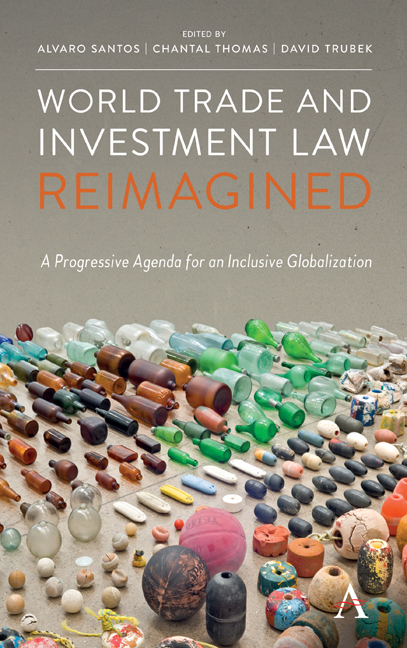Book contents
- Frontmatter
- Contents
- Acknowledgments
- List of Contributors
- Introduction World Trade and Investment Law in a Time of Crisis: Distribution, Development and Social Protection
- PART I RETHINKING THE POLITICAL ECONOMY OF TRADE: COMMENTS ON DANI RODRIK'S STRAIGHT TALK ON TRADE
- PART II SETTING THE STAGE FOR A PROGRESSIVE VISION: EMERGING ISSUES IN WORLD TRADE AND INVESTMENT LAW
- SECTION 1 MAPPING THE NEW CONTEXT FOR TRADE AND INVESTMENT LAW
- SECTION 2 DEALING WITH MAJOR CHANGES IN THE WORLD ECONOMY
- SECTION 3 FRAMING A MORE EQUITABLE INVESTMENT LAW REGIME
- SECTION 4 SUPPORTING DEVELOPMENT
- SECTION 5 REINFORCING SOCIAL PROTECTION: SPREADING THE BENEFITS OF TRADE, DEALING WITH LOSSES AND EXPLORING THE TRADE–IMMIGRATION NEXUS
- Chapter Nineteen Trade Agreements in the Twenty-First Century: Rethinking the Trade–Labor Linkage
- Chapter Twenty The New Frontier for Labor in Trade Agreements
- Chapter Twenty-One Re-embedding Liberalism: Introducing Passporting Fees for Free Trade
- Chapter Twenty-Two Restoring Trade's Social Contract in the United States
- Chapter Twenty-Three Migration and International Economic Asymmetry
- Index
Chapter Twenty-Three - Migration and International Economic Asymmetry
from SECTION 5 - REINFORCING SOCIAL PROTECTION: SPREADING THE BENEFITS OF TRADE, DEALING WITH LOSSES AND EXPLORING THE TRADE–IMMIGRATION NEXUS
Published online by Cambridge University Press: 07 September 2019
- Frontmatter
- Contents
- Acknowledgments
- List of Contributors
- Introduction World Trade and Investment Law in a Time of Crisis: Distribution, Development and Social Protection
- PART I RETHINKING THE POLITICAL ECONOMY OF TRADE: COMMENTS ON DANI RODRIK'S STRAIGHT TALK ON TRADE
- PART II SETTING THE STAGE FOR A PROGRESSIVE VISION: EMERGING ISSUES IN WORLD TRADE AND INVESTMENT LAW
- SECTION 1 MAPPING THE NEW CONTEXT FOR TRADE AND INVESTMENT LAW
- SECTION 2 DEALING WITH MAJOR CHANGES IN THE WORLD ECONOMY
- SECTION 3 FRAMING A MORE EQUITABLE INVESTMENT LAW REGIME
- SECTION 4 SUPPORTING DEVELOPMENT
- SECTION 5 REINFORCING SOCIAL PROTECTION: SPREADING THE BENEFITS OF TRADE, DEALING WITH LOSSES AND EXPLORING THE TRADE–IMMIGRATION NEXUS
- Chapter Nineteen Trade Agreements in the Twenty-First Century: Rethinking the Trade–Labor Linkage
- Chapter Twenty The New Frontier for Labor in Trade Agreements
- Chapter Twenty-One Re-embedding Liberalism: Introducing Passporting Fees for Free Trade
- Chapter Twenty-Two Restoring Trade's Social Contract in the United States
- Chapter Twenty-Three Migration and International Economic Asymmetry
- Index
Summary
The world is on the point of a stunning reversal. Nationalism and isolationism have surged against the global laws and institutions that have advanced economic liberalization and integration for half a century. Hostility is rising against international trade and international migration, both of which the new cadre of self-styled antiglobalists see as interrelated and threatening to national security and economic stability.
In the case of immigration that is not authorized, this anathema has slipped into a toxic stew of xenophobia and scapegoating, and has fed much of the political and ideological antiglobalist backlash and accompanying orientation toward border militarization that have become increasingly salient in the years since the 2008 global financial crisis. Those who cross borders without authorization in search of economic opportunity are, within this discourse, portrayed as morally culpable by virtue of their transgression of national immigration laws, particularly in the Global North. Less well-understood are the ways in which international law, itself significantly framed by the governments of the Global North, has helped shape the phenomenon of irregular migration. This includes the international law of trade, which forms one part of a larger architecture of globalization that over the past quarter-century has brought governments into liberalized arrangements vis-à-vis world markets.
This essay examines both the explanatory and the normative implications of the relationship between international trade, and international economic liberalization more generally, and irregular migration. It focuses on a detailed case study of the relationship between Mexico and the United States in the years leading up to and following the adoption of the North American Free Trade Agreement (NAFTA). While of course characterized by historical specificities, the broad contours of this dynamic pertain in many other instances of undocumented migration from countries in the Global South to destinations in the Global North.
The argument is the following: increased migration from Mexico to the United States, following NAFTA, was a function of (1) increased trade in the context of (2) significant wealth disparity between the two countries coupled with (3) adoption by the Mexican state of neoclassical measures that independently increased economic volatility and prevented the establishment of measures necessary to support both economic growth and stability. International trade liberalization is but one feature of an asymmetric world order that creates pressures for emigration from poor countries to rich countries.
- Type
- Chapter
- Information
- World Trade and Investment Law ReimaginedA Progressive Agenda for an Inclusive Globalization, pp. 241 - 256Publisher: Anthem PressPrint publication year: 2019



